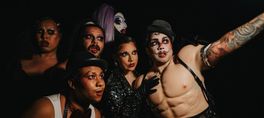Tue April 26, 2016
Please Join SF Bay ACS for, "The Diving Physiology and Capabilities of Breath-Hold Divers" with Birgitte McDonald.
SEE EVENT DETAILS
at Bay Model Visitor Center
(see times)
"The diving physiology and capabilities of breath-hold divers are crucial to their role in the ecosystem and their ability to exploit prey resources. During forced submersion, severe bradycardia (heart rate reduced to below resting) results in isolation of muscle and peripheral organs from blood flow, thereby conserving blood oxygen for the heart and brain. However, with the development of bio-loggers, studies on trained and freely diving animals indicate that this dive response’ is variable and often moderate. I will present my research investigating the dive response and oxygen management strategies in wild California sea lions and captive harbor porpoises using bio-loggers that measured blood oxygen, heart rate, and dive behavior during natural dives. I will discuss how sea lions and porpoises are able to optimize the amount of oxygen they take on a dive, and how the management of the oxygen differs depending on dive duration."
Birgitte McDonald is an assistant professor of Vertebrate Ecology at Moss Landing Marine Laboratories. Birgitte is a physiological and behavioral ecologist, who seeks to study the whole organism, using techniques from physiological, evolutionary and behavioral biology to better understand the mechanisms that determine the ecological niche of an organism. Her research has provided opportunities to work with a broad range of species (seals, sea lions, porpoises, dolphins and penguins) in a diversity of habitats from the Antarctic to the Galapagos. She received an M.A. in Biology from Sonoma State University in 2003 and a Ph.D. in Ecology and Evolutionary Biology from the University of California, Santa Cruz in 2009. After completion of
her Ph.D. she conducted 3 years of postdoctoral research at Scripps Institution of Oceanography studying the oxygen management strategies of wild California sea lion and the physiological ecology of emperor penguins. She then spent two years at Aarhus University in Denmark as a National Science Foundation International Fellow investigating the diving physiology and energetics of harbor porpoises before starting her position at Moss Landing in January 2015.
The diving physiology and capabilities of breath-hold divers are crucial to their role in the ecosystem and their ability to exploit prey resources. During forced submersion, severe bradycardia (heart rate reduced to below resting) results in isolation of muscle and peripheral organs from blood flow, thereby conserving blood oxygen for the heart and brain. However, with the development of bio-loggers, studies on trained and freely diving animals indicate that this ‘dive response’ is variable and often moderate. I will present my research investigating the dive response and oxygen management strategies in wild California sea lions and captive harbor porpoises using bio-loggers that measured blood oxygen, heart rate, and dive behavior during natural dives. I will discuss how sea lions and porpoises are able to optimize the amount of oxygen they take on a dive, and how the management of the oxygen differs depending on dive duration.
show less
Birgitte McDonald is an assistant professor of Vertebrate Ecology at Moss Landing Marine Laboratories. Birgitte is a physiological and behavioral ecologist, who seeks to study the whole organism, using techniques from physiological, evolutionary and behavioral biology to better understand the mechanisms that determine the ecological niche of an organism. Her research has provided opportunities to work with a broad range of species (seals, sea lions, porpoises, dolphins and penguins) in a diversity of habitats from the Antarctic to the Galapagos. She received an M.A. in Biology from Sonoma State University in 2003 and a Ph.D. in Ecology and Evolutionary Biology from the University of California, Santa Cruz in 2009. After completion of
her Ph.D. she conducted 3 years of postdoctoral research at Scripps Institution of Oceanography studying the oxygen management strategies of wild California sea lion and the physiological ecology of emperor penguins. She then spent two years at Aarhus University in Denmark as a National Science Foundation International Fellow investigating the diving physiology and energetics of harbor porpoises before starting her position at Moss Landing in January 2015.
The diving physiology and capabilities of breath-hold divers are crucial to their role in the ecosystem and their ability to exploit prey resources. During forced submersion, severe bradycardia (heart rate reduced to below resting) results in isolation of muscle and peripheral organs from blood flow, thereby conserving blood oxygen for the heart and brain. However, with the development of bio-loggers, studies on trained and freely diving animals indicate that this ‘dive response’ is variable and often moderate. I will present my research investigating the dive response and oxygen management strategies in wild California sea lions and captive harbor porpoises using bio-loggers that measured blood oxygen, heart rate, and dive behavior during natural dives. I will discuss how sea lions and porpoises are able to optimize the amount of oxygen they take on a dive, and how the management of the oxygen differs depending on dive duration.
"The diving physiology and capabilities of breath-hold divers are crucial to their role in the ecosystem and their ability to exploit prey resources. During forced submersion, severe bradycardia (heart rate reduced to below resting) results in isolation of muscle and peripheral organs from blood flow, thereby conserving blood oxygen for the heart and brain. However, with the development of bio-loggers, studies on trained and freely diving animals indicate that this dive response’ is variable and often moderate. I will present my research investigating the dive response and oxygen management strategies in wild California sea lions and captive harbor porpoises using bio-loggers that measured blood oxygen, heart rate, and dive behavior during natural dives. I will discuss how sea lions and porpoises are able to optimize the amount of oxygen they take on a dive, and how the management of the oxygen differs depending on dive duration."
Birgitte McDonald is an assistant professor of Vertebrate Ecology at Moss Landing Marine Laboratories. Birgitte is a physiological and behavioral ecologist, who seeks to study the whole organism, using techniques from physiological, evolutionary and behavioral biology to better understand the mechanisms that determine the ecological niche of an organism. Her research has provided opportunities to work with a broad range of species (seals, sea lions, porpoises, dolphins and penguins) in a diversity of habitats from the Antarctic to the Galapagos. She received an M.A. in Biology from Sonoma State University in 2003 and a Ph.D. in Ecology and Evolutionary Biology from the University of California, Santa Cruz in 2009. After completion of
her Ph.D. she conducted 3 years of postdoctoral research at Scripps Institution of Oceanography studying the oxygen management strategies of wild California sea lion and the physiological ecology of emperor penguins. She then spent two years at Aarhus University in Denmark as a National Science Foundation International Fellow investigating the diving physiology and energetics of harbor porpoises before starting her position at Moss Landing in January 2015.
The diving physiology and capabilities of breath-hold divers are crucial to their role in the ecosystem and their ability to exploit prey resources. During forced submersion, severe bradycardia (heart rate reduced to below resting) results in isolation of muscle and peripheral organs from blood flow, thereby conserving blood oxygen for the heart and brain. However, with the development of bio-loggers, studies on trained and freely diving animals indicate that this ‘dive response’ is variable and often moderate. I will present my research investigating the dive response and oxygen management strategies in wild California sea lions and captive harbor porpoises using bio-loggers that measured blood oxygen, heart rate, and dive behavior during natural dives. I will discuss how sea lions and porpoises are able to optimize the amount of oxygen they take on a dive, and how the management of the oxygen differs depending on dive duration.
read more
Birgitte McDonald is an assistant professor of Vertebrate Ecology at Moss Landing Marine Laboratories. Birgitte is a physiological and behavioral ecologist, who seeks to study the whole organism, using techniques from physiological, evolutionary and behavioral biology to better understand the mechanisms that determine the ecological niche of an organism. Her research has provided opportunities to work with a broad range of species (seals, sea lions, porpoises, dolphins and penguins) in a diversity of habitats from the Antarctic to the Galapagos. She received an M.A. in Biology from Sonoma State University in 2003 and a Ph.D. in Ecology and Evolutionary Biology from the University of California, Santa Cruz in 2009. After completion of
her Ph.D. she conducted 3 years of postdoctoral research at Scripps Institution of Oceanography studying the oxygen management strategies of wild California sea lion and the physiological ecology of emperor penguins. She then spent two years at Aarhus University in Denmark as a National Science Foundation International Fellow investigating the diving physiology and energetics of harbor porpoises before starting her position at Moss Landing in January 2015.
The diving physiology and capabilities of breath-hold divers are crucial to their role in the ecosystem and their ability to exploit prey resources. During forced submersion, severe bradycardia (heart rate reduced to below resting) results in isolation of muscle and peripheral organs from blood flow, thereby conserving blood oxygen for the heart and brain. However, with the development of bio-loggers, studies on trained and freely diving animals indicate that this ‘dive response’ is variable and often moderate. I will present my research investigating the dive response and oxygen management strategies in wild California sea lions and captive harbor porpoises using bio-loggers that measured blood oxygen, heart rate, and dive behavior during natural dives. I will discuss how sea lions and porpoises are able to optimize the amount of oxygen they take on a dive, and how the management of the oxygen differs depending on dive duration.
show less
Date/Times:
Bay Model Visitor Center
2100 Bridgeway, Sausalito, CA
The Best Events
Every Week in Your Inbox
From Our Sponsors
UPCOMING EVENTS
Great suggestion! We'll be in touch.
Event reviewed successfully.








